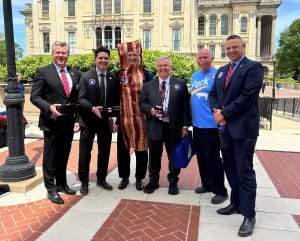Biden trade strategy under fire on Capitol Hill
Legislative Watch: USTR needs to protect interests of American farmers; Bills to reform trade laws advance in House; Vilsack defends USDA budget to Congress.
April 19, 2024

On Tuesday, U.S. Trade Representative Katherine Tai testified before the House Ways and Means Committee regarding the Biden administration’s trade agenda. Under intense questioning from Republicans on the panel, Tai defended the administration’s efforts, which have shunned pursuit of new free trade agreements in favor of smaller agreements.
Ways and Means Committee Chairman Jason Smith (R-Mo.) harshly criticized this approach. “The administration has also unfortunately chosen a go-it-alone trade policy that consists of endless dialogues and unenforceable trade ‘frameworks’ that fail to open new markets to American products and circumvent Congressional constitutional authority over trade,” he said.
Chairman Smith also expressed frustration with the Biden administration’s work on agricultural trade. “U.S. agriculture producers benefit when the administration aggressively pursues a trade agenda that prioritizes their interests, and when USTR goes to bat for them around the world,” he said. “USTR must be far more aggressive in protecting the interests of American farmers. Meanwhile, this administration has sat idly by while China continues to spread its malign global influence.”
Tai stated that the administration believes full-scale free trade agreements tend to help some parts of the economy, such as agriculture, at the expense of others. “We are taking a different approach, and our approach is built on the basic principle that we should not be pitting Americans against Americans, and American sectors against American sectors,” she said.
Bills to reform trade laws advance in House
One day after Ambassador Tai’s appearance before the House Ways and Means Committee, the panel considered and approved six trade-related bills covering a variety of topics. Three of the bills specifically target China and its perceived abuses of international trade, two push back on Biden administration trade policy and one focuses on encouraging open trade with Israel.
The “Generalized System of Preferences (GSP) Reform Act,” offered by Rep. Adrian Smith (R-Neb.), proposes to renew the GSP program through 2030 and reform how it operates. GSP allowed developing countries to export some goods to the U.S. duty-free, but it expired in 2020. The reform bill would permanently prohibit China from participating in GSP and allow the U.S. to take into consideration whether other countries are increasing their ties to China when evaluating them for the program.
The GSP Reform Act would be “the most significant reform and the longest renewal in the 50-year history of the Generalized System of Preferences,” according to Ways and Means Chairman Jason Smith (R-Mo.). Supporters also claim it would ensure fair treatment for U.S. agricultural exports and strengthen anti-corruption standards.
Five of the six bills passed along party lines, while one bill reining in China’s cobalt mining practices, including forced labor of children and adults, garnered some bipartisan support. The legislation is now eligible for consideration by the full House.
Vilsack defends USDA budget to Congress
On Tuesday, Secretary of Agriculture Tom Vilsack testified before the Senate Appropriations Committee’s Agriculture Subcommittee regarding President Biden’s fiscal year 2025 budget request. Vilsack touted the work his department has conducted over the past three years to alleviate rural poverty and increase the employment rate in counties classified as “persistently poor.” He also highlighted the significant needs for additional research and facilities funding, as well as the importance of funding efforts to combat highly pathogenic avian influenza.
Supporting small and mid-sized farmers against consolidation has become one of Vilsack’s highest priorities during the Biden administration. He cited numerous statistics regarding the number of farms and acreage of farmland lost in recent years and emphasized USDA’s efforts to slow or reverse this trend.
“We have, for the first time, put together a comprehensive effort to provide support for small and mid-sized farming operations, in addition to the extraordinarily important productive agriculture [of larger producers],” he said.
Subcommittee Chairman Martin Heinrich (D-N.M.) pushed Vilsack to continue aggressively pursuing a climate change mitigation agenda through multiple avenues.
“I’m pleased that this budget request maintains our focus on providing tools to producers and rural communities to become part of our overall effort to solve climate change,” Heinrich said. “Of particular importance to me is supporting our conservation programs to help producers be good stewards of our land. We know these programs are vital to managing lands and combatting climate change.”
About the Author(s)
You May Also Like




